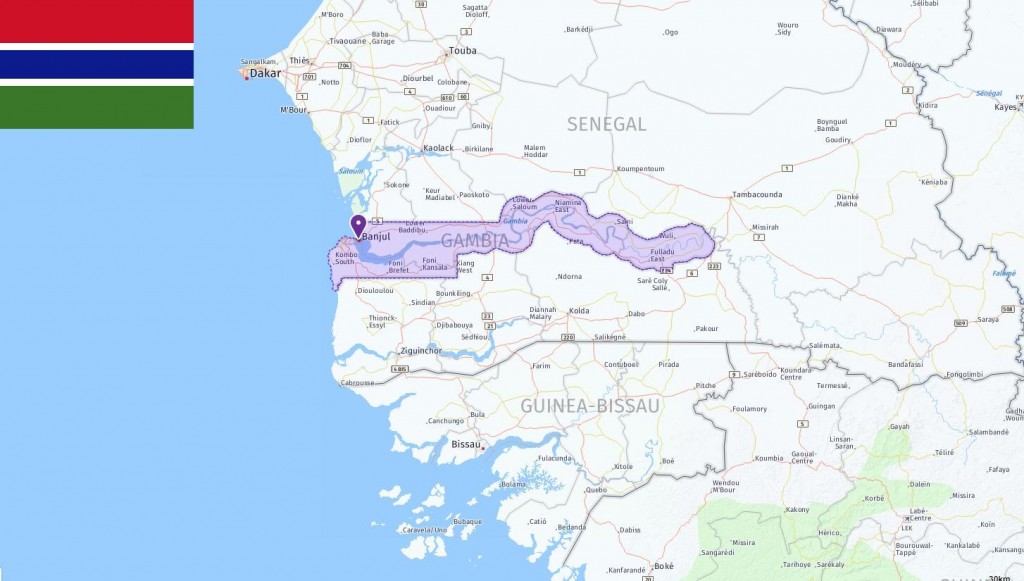GM is the abbreviation for Gambia, the 159th largest country in the world. Officially the Republic of the Gambia, Gambia is a country located in West Africa, bordering Senegal. Banjul is the capital city of Gambia. Top 10 biggest cities are Serrekunda (population: 339,989), Brikama (population: 77,689), Bakau (population: 43,087), Banjul (population: 34,578), Farafenni (population: 29,856), Lamin (population: 24,786), Sukuta (population: 15,120), Basse Santa Su (population: 14,369), Gunjur (population: 14,077), and Soma (population: 9,858).
Country Profile
- Capital: Banjul
- Language: English
- Area: 10,689 km2
- Population: 2,051,352
- Currency: Dalasi (GMD)
- Time zone: UTC+0
- Calling code: 220
- ISO 2-Letter Abbreviation: GM
- UN 3-Letter Abbreviation: GMB
- Internet TLD: .gm
- State Government Website: http://visitthegambia.gm
List of Gambia Acronyms
The most commonly used abbreviations about Gambia are GM which stands for Gambia and GMD which means Dalasi (Gambia currency). In the following table, you can see all acronyms related to Gambia, including abbreviations for airport, city, school, port, government, and etc.

Geography
The Gambia is the smallest country on the African continent. The country is long and narrow, and is bordered by Senegal in the north, east and south. The whole country is in a valley with the Gambia pupil running in the middle. The river is the country’s most important transport year, and the river banks consist of swamp and mangrove forest. The Gambia River opens into the Atlantic Ocean at the capital Banjul. The climate is tropical with long periods of drought, and irregular rainfall. The country is flat and the highest point is Red Rock at 53 meters above sea level
The location along the river banks makes the country very vulnerable to floods and floods, as well as the country is also exposed to prolonged drought. The unpredictable climate is causing major damage to infrastructure, agriculture and buildings. The greatest man-made environmental challenges are deforestation, which causes the destruction of large natural areas, and threatens wildlife and destroys cultivable land. Poor and contaminated water due to garbage and sewage contributes to widespread disease transmission among the population.
History
In the 13th century, the Gambian land area was part of the great Mali kingdom. As this disintegrated, local kingdoms such as Barra, Kombo and Fulladu took control. The country became the center of British, Portuguese and French trade in the 16th century. Trading was based on gold, ivory and slaves. For a long time the British and French changed control of the country, but in 1901 the Gambia formally became a British protectorate. During the 1950s, several political parties emerged, and in 1962 the country gained internal autonomy. In 1965, the country became completely independent within the Commonwealth of Nations.
The same president ruled the country from independence until a military coup in 1994. The non-bloody coup was carried out by a group of young officers led by Lieutenant Yahya Jammeh. Jammeh retained power for 22 years before losing a Democratic presidential election in 2016. After first recognizing the election, Jammeh still refused to give power to the newly elected president. The president got help from regional forces, backed by the UN, and pushed Jammeh to resign. Since 2017, the democratically elected president has ruled the country.
Society and politics
The Gambia is a presidential republic. The president is elected every five years and can be re-elected an indefinite number of times. The president is the country’s head of state, head of government and military commander. On paper, Gambia has long been a democracy, but in the period 1996 to 2017 the president had almost all power and the political opposition was suppressed. The opposition has blamed the former president for electoral fraud and for using the country’s security forces to threaten the people of the polls.
The Gambia is poorly developed and the standard of living is low. The health system has major shortcomings and there is a great lack of hospitals, nurses and doctors. However, better access to clean drinking water and better infrastructure has increased life expectancy in recent years. Child mortality has also dropped somewhat. Society and the labor market are characterized by old traditional divisions of male and female roles. Violence and abuse against women and children are common and are rarely reported to the police. Gay people can face the death penalty if they do not leave the country.
Economics and Commerce
The Gambia has few natural resources, and only one-sixth of the land is cultivable. Nevertheless, about a third of the population is employed in agriculture, most of which produce only for their own consumption. The most important agricultural product is peanuts, which make up more than 90 per cent of the country’s export revenue. The industry is small and based on the pressing of peanuts to oil. The service industry and tourism are especially important for the country’s economy. This industry employs about 55 percent of the population, and accounts for over 60 percent of the gross domestic product. The country has a large trade deficit (they import more than they export), and is dependent on international assistance.
The Gambia has experienced good economic growth in recent years. At the same time, living standards among the country’s poorest have deteriorated. Today, just under half of the population lives below the national poverty line, while around 10 percent live in absolute poverty. Unemployment is high, and illegal economic activity such as smuggling of goods and drugs is common. Many Gambians rely on money sent home (referrals) by relatives and friends abroad.
View this article in other languages:
Deutsch – Français – 繁體中文


